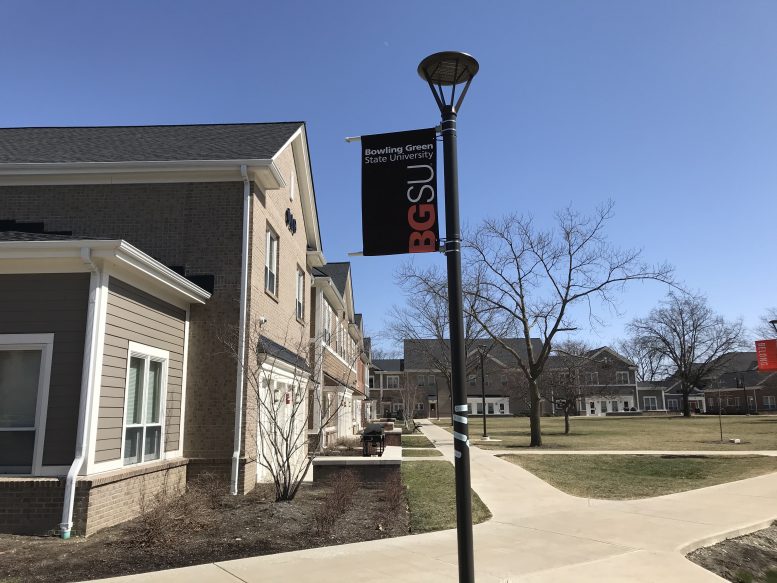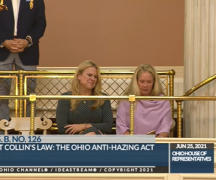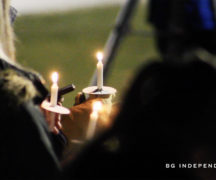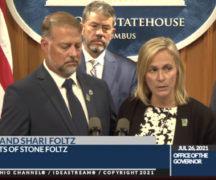By DAVID DUPONT
BG Independent News
Eliminating hazing will make Bowling Green State University a better place for everyone, President Rodney Rogers said in an interview last week.
“While a lot of this is focused on anti-hazing and getting to that specific core issue, we fundamentally want to make sure we’re building a learning community at this institution where each member belongs, each member is supported and respected,” he said.
“When we begin to think about this concept of community of care we are referring to the idea that we are together in this learning community, and we will be a better university if we support each other and look out for each other and push each other to achieve excellence to be sure.”
The increased focus on ending hazing in Greek organizations and other campus groups was prompted by the death in March of sophomore Stone Foltz from alcohol poisoning after a hazing incident. Members of the Pi Kappa Alpha allegedly involved in the hazing have been expelled or suspended from BGSU and face criminal charges and a civil lawsuit.
“I do think if this very tragic event results in the strengthening of the resolve in this community to support each that would be a positive outcome.,” Rogers said.
Foltz’ death prompted action at the state level. The state legislature passed and Gov. Mike DeWine signed Collin’s Law, named for Collin Wiant who died in a hazing incident at Ohio University. The Inter-University Council, which brings together Ohio’s state universities, also passed a set of anti-hazing principles. Rogers said that the university’s chief counsel, Natalie Jackson, played a key role in formulating those principles.
One of those is the concept of “zero tolerance.”
That involves, Rogers said, knowing what’s expected and what the consequences are if they are not met. “We have certain situations where certain actions, if found guilty, will lead to suspension or expulsion from the institution.”
That involved an intensive educational component for Greek organizations at the start of the semester, and an intention to continue that education and monitoring throughout the year.
Ethan Murphy, president of the Interfraternity council and a member of Alpha Tau Omega, said that Greek organizations had to “go through a bit of a ringer” in order to continue to operate on campus. He praised the administration’s response and willingness to work with the membership.
After what occurred last semester, that has actually injected some energy back in the community.
At the time of Foltz’ death, he said, there was deep sadness and confusion. “A lot of the community couldn’t believe it occurred,” he said. “We didn’t know how to move forward.”
Now, he said, “we have direction.”
Murphy said that this “opens up your eyes in our community.” Men in his fraternity are discussing and talking about making sure it doesn’t happen.
Changes are needed, said Connor Zimmer, the vice president of marketing for the Inter Fraternity Council and a member of Sigma Chi. “You don’t think this will happen to us. Then it happens and you realize we should have done something earlier. The changes now will set us up for future success.”
“I feel all of us coming together and resolving the issues we see cannot help but make us stronger, Murphy said
Rogers said in addition to the expanded and ongoing education requirements, the university has also expanded those who are required to report hazing to include all university employees as well as volunteers acting in an official capacity. “So we have more eyes and ears.”
The university is also reaching out to families through the new office of Parents, Families and New Student Connections. A program at SOAR addressed the issue. “What we want to do is just make sure parents are aware,” Rogers said. “Here’s something to look out for and here’s who to call if you’re concerned. We want to make sure those family members are watching out and listening and then let us know.”
The university’s definition of hazing is aligned with that in Collin’s Law. The hazing covered under the law, which made it a felony, is an activity that puts someone into emotional or physical danger.
But there are lesser forms of harassment and bullying.
“There are certain activities that organizations do to build community and get to know each other,” Rogers said. “Some of the historic ways people get that done is hazing. We want to help these organizations think about different ways that you can achieve that goal. … That will be part of our anti-hazing education.”
This applies to all organizations on campus, not just fraternities and sororities. Any campus organization whether marching band, varsity or club sports that wants to build a sense of camaraderie needs to be aware that certain practices cross the line. “We want to make sure that they’re also aware of what is hazing and making sure any of those organizations are aware of those concerns,” Rogers said.
No issues from those groups have been reported, he said.
Ben Batey, whose portfolio as the university’s chief health officer has expanded to chief health and wellness officer, met with the marching band about the anti-hazing policy. Rogers said members were “very responsive” and had a lot of questions.
That outreach will extend to other campus groups.
Batey is taking the lead along with Dean of Students Christopher Bullins in implementing the anti-hazing initiative. Batey is a member of the president’s cabinet.”
The university wants someone at “a very high level” who is dealing with the health and wellness of the campus community, Rogers said. “By putting this in his portfolio, it also raises how important the anti-hazing strategy is.”
Murphy said this starts with internal accountability. “I think members are aware of what needs to be done and what proper behavior is on campus.”
Interest in Greek life, both Murphy and Zimmer of the Interfraternity Council said, is strong.
Coming out of the pandemic with its forced isolation has made more students interested in Greek organizations.
“A fraternity is the ultimate support system to a freshman and sophomore,” Murphy said. It offers academic help, social activities, community service experiences, and leadership opportunities. “I felt that the system of having brothers on campus is huge especially coming out of COVID.”
And often members of Greek life take what they learn to other leadership positions including student government and serving as student representatives to the Board of Trustees.
Now they are charged with making sure hazing is eliminated.
“My fraternity is more engaged in the educational process, more engaged in remembering the stuff and applying it,” Zimmer said.
“I don’t see how it cannot make Greek life stronger,” Murphy said. “Clearly the behavior that happened last semester is the opposite of a strong community. What happen is the opposite of coming together. I feel that all of us coming together and resolving the issues we see cannot help but make us stronger.”





